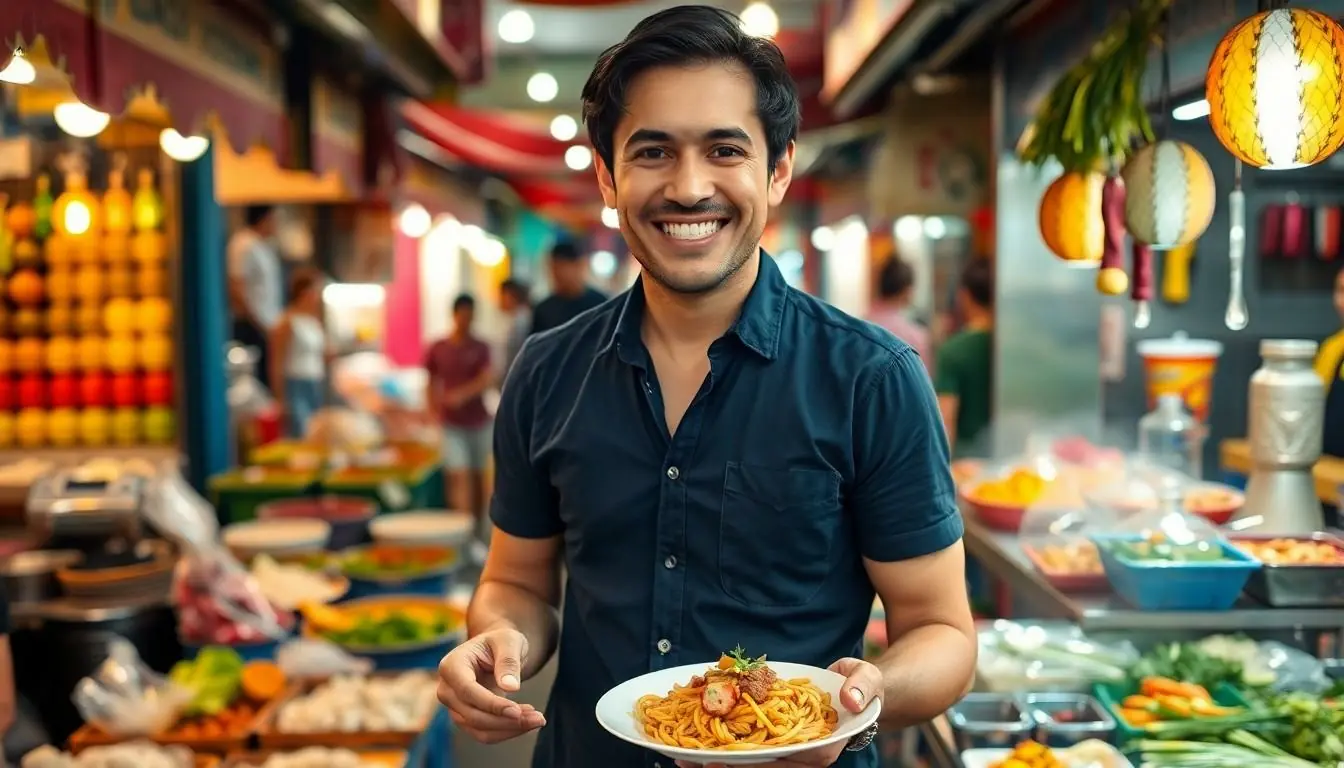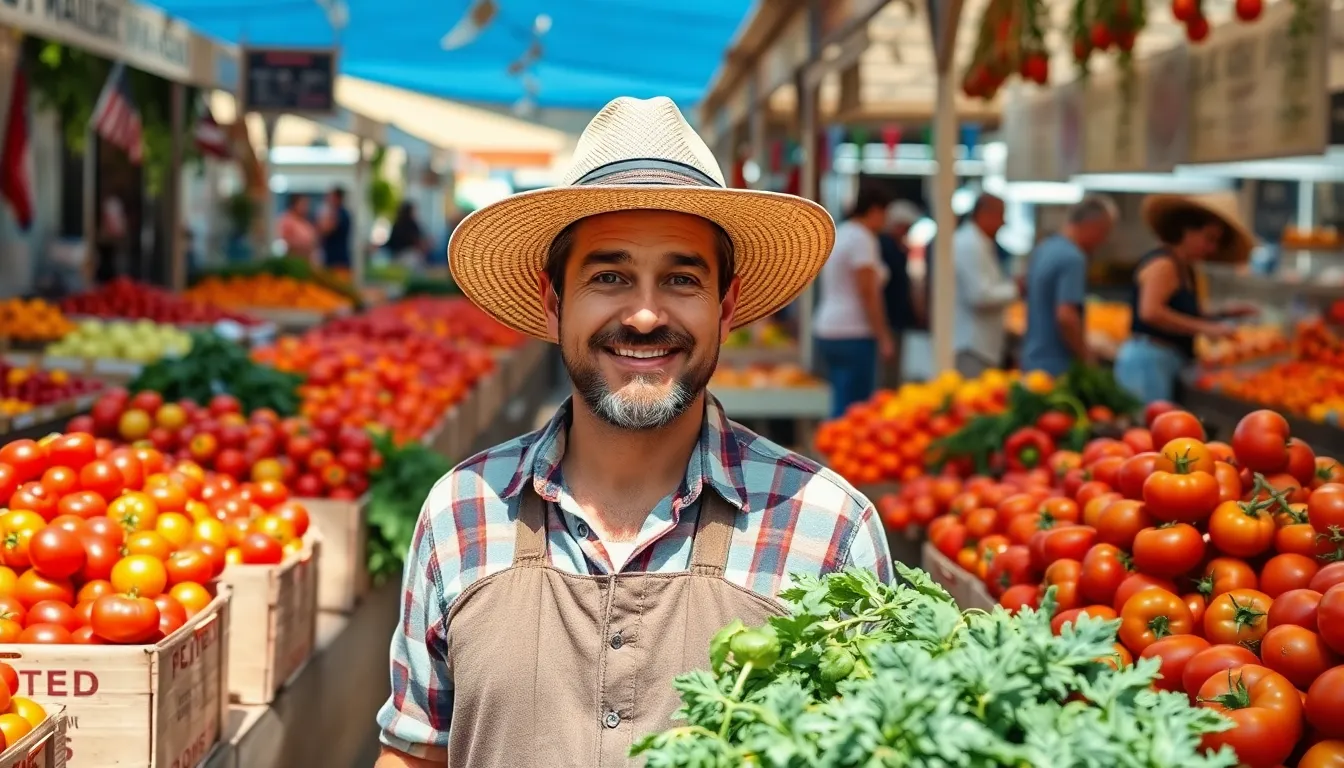Travel food show hosts are the delightful guides who whisk viewers away on a culinary adventure, exploring the world one bite at a time. With a sprinkle of humor and a dash of charm, they dive into local cuisines, uncovering hidden gems that make mouths water and stomachs growl. These hosts don’t just eat—they embark on a delicious quest, turning every meal into a story worth sharing.
From the bustling streets of Bangkok to the quaint cafes of Paris, they navigate the globe with a fork in one hand and a camera in the other. Their passion for food and culture transforms each episode into a feast for the senses, leaving audiences craving more than just a snack. So buckle up and get ready to discover why these culinary adventurers are the unsung heroes of travel television, serving up laughs and unforgettable flavors along the way.
Table of Contents
ToggleOverview of Travel Food Show Hosts
Travel food show hosts serve as culinary ambassadors, showcasing diverse cultures through their local cuisines. They offer viewers an immersive experience that combines travel, food, and storytelling. Engaging viewers with humor and charisma, these hosts navigate bustling markets, quaint restaurants, and unique food stalls.
A variety of professionals fill this role, including chefs, food critics, and travel enthusiasts. Each brings a unique perspective, enhancing the show’s appeal. Culinary experts provide in-depth knowledge about cooking techniques, while travel enthusiasts highlight cultural contexts. In doing so, they enrich the audience’s understanding of global food traditions.
Episodes frequently feature popular destinations like Bangkok and Paris, emphasizing the vibrancy of street food and the charm of local dining. Hosts uncover culinary gems that viewers might overlook, offering insider tips on where to eat. Experiences range from tasting exotic dishes to participating in hands-on cooking classes, adding layers to the narrative.
Authenticity remains a key element of their storytelling. Hosts build connections with local chefs, families, and street vendors, enhancing the authenticity of the content. This relationship allows viewers to experience the food as locals do, fostering a deeper appreciation for each dish.
Culinary adventures keep audiences anticipating the next episode. With every filmed journey, hosts create memorable content that resonates with food lovers and travelers alike. The blend of entertainment and education positions these hosts as vital figures in culinary travel media.
Popular Travel Food Show Hosts

Travel food show hosts captivate audiences with their unique styles and backgrounds. Each brings a distinct flavor to culinary exploration, making them memorable figures in the travel food landscape.
Host 1: Background and Style
Anthony Bourdain, a celebrated chef and author, gained fame for his immersive storytelling approach. His exploration of cultures through cuisine highlighted authentic dining experiences. Unfiltered and honest, Bourdain unearthed hidden culinary gems in every corner of the world, connecting easily with locals. Humor intertwined with his insights made for engaging narratives that resonated widely. Audiences appreciated his candid approach to food and travel, establishing him as an influential figure in the genre.
Host 2: Background and Style
Emeril Lagasse brought his vibrant personality and passion for cooking to the travel food scene. Known for his catchphrase “Bam!”, his energetic style engaged viewers from the start. He showcased both traditional dishes and innovative recipes while traveling to regional hotspots. Lagasse’s enthusiasm for regional flavors transformed each meal into an unforgettable adventure. His culinary expertise, combined with a love for exploration, created a thrilling viewing experience that kept fans coming back for more.
Host 3: Background and Style
Gordon Ramsay, an internationally acclaimed chef, offers a fiery presence and relentless dedication to food quality. His hosting style merges intense passion with expert knowledge on cuisine. Viewers appreciate his no-nonsense approach, providing not only entertaining content but also culinary education. Ramsay’s travels take audiences through diverse locales where he interacts with local chefs and learns intricate food traditions. This blend of drama and discovery makes his shows a dynamic choice for adventure-minded food enthusiasts.
Impact on Culinary Exploration
Travel food show hosts inspire culinary exploration by showcasing the rich interplay between cultures and cuisines. Their programs serve as platforms for cultural exchange, illustrated through the food each location offers.
Cultural Exchange Through Food
Culinary exploration fosters understanding between diverse communities. Hosts invite viewers into local homes and kitchens, sharing family recipes and traditions. Authentic interactions with chefs and vendors enrich narratives, revealing personal stories behind signature dishes. Every meal highlights cultural significance and regional ingredients, encouraging appreciation for global food diversity. As hosts travel, they promote awareness of local customs, enhancing viewers’ knowledge of different ways of life.
Influence on Viewers’ Travel Choices
Travel food shows significantly shape viewers’ travel decisions. Each episode showcases unique dishes and destinations, sparking interest in exploring new locations. Viewers often feel compelled to visit these culinary hotspots after seeing vibrant street markets or charming local restaurants. Recommendations provided by engaging hosts create a sense of trust, motivating audiences to embark on their own culinary adventures. The combination of visual allure and expert insights drives travel choices towards experiencing the world’s flavors firsthand.
Memorable Episodes and Highlights
Travel food shows feature countless memorable episodes that resonate with audiences. Anthony Bourdain’s adventures in Vietnam stand out, showcasing not only the food but also the culture. He explored traditional pho joints and street stalls, revealing stories behind each dish. Emeril Lagasse shined in New Orleans, introducing viewers to the vibrant Creole cuisine, where he highlighted gumbo and jambalaya while embracing local music.
Gordon Ramsay captivated audiences in Italy, where he ventured into local kitchens, learning the secrets of authentic pasta making. Each episode illustrates his fiery personality and dedication to culinary excellence. Viewers appreciated the authenticity found in the hosts’ interactions with local chefs and families, creating moments that felt genuine.
Specific highlights include episodes dedicated to unusual food experiences. For instance, the exploration of insect dishes in Thailand opened viewers’ minds to unique culinary practices. Engaging with local street vendors created not just a dining experience but an insight into the daily lives of the locals.
Interactive cooking classes featured in several shows encourage audience participation, making viewers feel connected to the dishes being prepared. Culinary lessons alongside local chefs enable audiences to appreciate regional specialties. Furthermore, discovering hidden gems in lesser-known destinations invites exploration beyond typical tourist hotspots.
Each of these rich experiences fosters a sense of wanderlust. Memorable moments resonate long after episodes end, motivating viewers to explore diverse cuisines and cultures. By blending storytelling with culinary delights, these hosts inspire an enduring appreciation for global gastronomy.
Travel food show hosts play a crucial role in bridging cultures through culinary storytelling. Their unique ability to connect with local communities and showcase authentic dishes transforms ordinary meals into extraordinary experiences. Each episode invites viewers on a journey that goes beyond food, fostering appreciation for diverse cultures and traditions.
As they explore vibrant street food scenes and hidden dining gems, these hosts inspire wanderlust and culinary curiosity. Their engaging storytelling not only entertains but also educates audiences about the rich tapestry of global cuisines. With every adventure, they encourage viewers to embark on their own culinary explorations, making them indispensable figures in the world of travel media.





